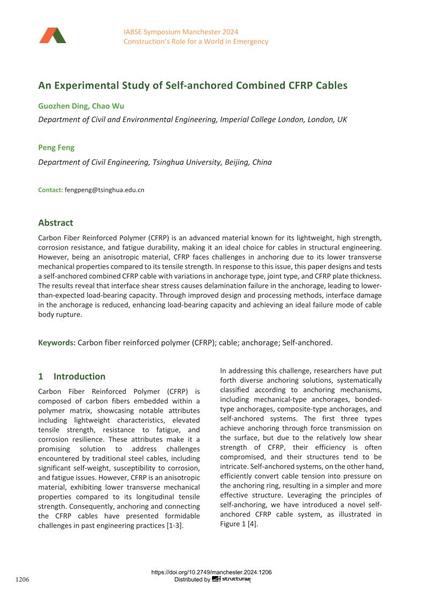An Experimental Study of Self-anchored Combined CFRP Cables

|
|
|||||||||||
Bibliografische Angaben
| Autor(en): |
Guozhen Ding
(Department of Civil and Environmental Engineering, Imperial College London, London, UK)
Chao Wu (Department of Civil and Environmental Engineering, Imperial College London, London, UK) Peng Feng (Department of Civil Engineering, Tsinghua University, Beijing, China) |
||||
|---|---|---|---|---|---|
| Medium: | Tagungsbeitrag | ||||
| Sprache(n): | Englisch | ||||
| Tagung: | IABSE Symposium: Construction’s Role for a World in Emergency, Manchester, United Kingdom, 10-14 April 2024 | ||||
| Veröffentlicht in: | IABSE Symposium Manchester 2024 | ||||
|
|||||
| Seite(n): | 1206-1211 | ||||
| Anzahl der Seiten (im PDF): | 6 | ||||
| DOI: | 10.2749/manchester.2024.1206 | ||||
| Abstrakt: |
Carbon Fiber Reinforced Polymer (CFRP) is an advanced material known for its lightweight, high strength, corrosion resistance, and fatigue durability, making it an ideal choice for cables in structural engineering. However, being an anisotropic material, CFRP faces challenges in anchoring due to its lower transverse mechanical properties compared to its tensile strength. In response to this issue, this paper designs and tests a self-anchored combined CFRP cable with variations in anchorage type, joint type, and CFRP plate thickness. The results reveal that interface shear stress causes delamination failure in the anchorage, leading to lower- than-expected load-bearing capacity. Through improved design and processing methods, interface damage in the anchorage is reduced, enhancing load-bearing capacity and achieving an ideal failure mode of cable body rupture. |
||||
| Stichwörter: |
Seil Ankerblock
|
||||
